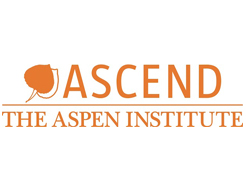
This blog originated through Ascend at the Aspen Institute on Thursday, November 29, 2018.
What is meaningful work? What does it mean for a family to thrive? There are certain conditions in and outside of work that lay the economic, health, and educational foundation for families to prosper that are often not met. Government entities often silo their support for child care, education, and career development instead of treating these as equally vital in improving outcomes for families. Many employers do not offer paid leave for employees that need to take time off to care for newborn, sick, or elderly family members. Parents that are paid low wages are often subject to punitive federal and state policies that are intended to help families struggling to get by, but in reality place barriers between them and higher education and new careers.
Thriving is about having access to affordable, high-quality early learning and child care supports. It is the opportunity to earn postsecondary credentials so your children have a path to a better future. It is the ability to take paid time off to care for a loved one. Above all, we believe work should be infused with dignity.
And we know that thriving families and a diverse workforce also translates into an economically thriving country. A prosperous America requires a new vision of the future of work that values how family, health, and a new learning landscape are driving opportunities for economic growth for our communities, cities, and country.
While the definition of “work” may vary by person and by industry, it is frequently colored by preconceived notions. We must change the narrative around work to reflect an alignment of what families need to the workforce America needs so we can truly transform policies, systems, and practices to support families. And as one of our new Aspen Family Prosperity Innovation Community (Family Prosperity) Partners said, “Stability is not enough. It’s got to be prosperity, it’s got to be thriving.”
That is what we strive to accomplish with Family Prosperity. Back in May, we convened Family Prosperity, including Family Prosperity Partners from primarily national policy organizations – American Enterprise Institute, Center for Public Justice, Family Vaues @ Work and the Center for Law and Social Poicy, Legal Aid at Work, National Partnership for Women and Families, and Urban Institute – in Aspen, where we talked about the future of work in the public and private sectors, and how crucial issues like child care and paid family leave are to working families.
This fall we welcomed the newest cohort of organizations to Family Prosperity, 10 of Ascend’s Network Partners that bring real world experiences to the ongoing policy conversation: All Our Kin, Central New Mexico Community College, Community Caring Collaborative, MOMS Partnership, Springboard to Opportunities, The Family Partnership, United Way of Greater Cincinnati, United Teen Equality Center, Washington State Budget & Policy Center, and West Michigan Center for Arts and Technology. They come from as far west as Washington to the northeast tip of Maine, and everywhere in between; they represent organizations working in urban cities, suburban communities, and rural farmland. Wherever they are, their work is making a major impact in their communities: In New Haven, All Our Kin is revolutionizing how women build and own their own high quality early childhood centers; in Western Michigan, WMCAT is transforming young parents’ lives with new workforce opportunities partnered with employer mentorships.
We heard firsthand about how these organizations are collaborating with families to create programs that address their definition of “work” and what it takes to not only get by, but to really prosper. These new Family Prosperity Partners address a variety of issues vital to working families, including education, child care and mental health supports. What I loved most about the day, in addition to hearing about their great work, were the connections they were making with each other about best practices and lessons learned they could take home to share with their communities in different corners of the country. That is the magic of Family Prosperity.
The full community recently came together in Washington, D.C. to cross-pollinate expertise – from Fortune 500 executive insights, to leading family services practitioners’ best practices in local communities, to cutting edge national policy research. The richness and strategic variety of their content knowledge is the secret sauce to the truly innovative work we have already seen spark out of Family Prosperity. To address the full suite of supports families need, we must all come together to think big and think differently. Stay tuned for an analysis of the big ideas that sparked out of this convening, and for more insights from Family Prosperity in the coming months.



